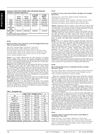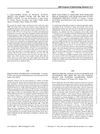 September 2022 in “Journal of the American Academy of Dermatology”
September 2022 in “Journal of the American Academy of Dermatology” Patients with lichen planopilaris/frontal fibrosing alopecia have a higher rate of vitamin D deficiency than the general US population.
 June 2021 in “Pakistan Journal of Medical and Health Sciences”
June 2021 in “Pakistan Journal of Medical and Health Sciences” The study found no link between hair loss, stress, and smoking among men in Lahore.
 December 2020 in “Our Dermatology Online”
December 2020 in “Our Dermatology Online” Skin biopsies are recommended for confirming alopecia diagnosis due to variability in clinical assessments; the link between vitamin D levels and alopecia is unclear.
January 2020 in “Proyecto de investigación:” Longer anogenital distance may indicate a higher chance of having polycystic ovary syndrome, and measuring this distance along with hormone levels could improve diagnosis.
 August 2019 in “Journal of Investigative Dermatology”
August 2019 in “Journal of Investigative Dermatology” Skin may help in getting rid of excess iron through the process of skin cell renewal.
 April 2018 in “Journal of Investigative Dermatology”
April 2018 in “Journal of Investigative Dermatology” Both Th1 and Th2 immune responses are increased in alopecia areata, with Th2 response more strongly linked to how severe the disease is.
 August 2017 in “韓方眼耳鼻咽喉皮膚科學會誌 = The journal of Korean Medicine Ophthalmology & Otolaryngology & Dermatology”
August 2017 in “韓方眼耳鼻咽喉皮膚科學會誌 = The journal of Korean Medicine Ophthalmology & Otolaryngology & Dermatology” Early-onset male baldness is significantly linked to a higher risk of metabolic syndrome.
 April 2016 in “Journal of The American Academy of Dermatology”
April 2016 in “Journal of The American Academy of Dermatology” Both atopy and eosinophilia are linked to more severe hair loss in people with alopecia areata.
 October 2013 in “Journal of the American College of Cardiology”
October 2013 in “Journal of the American College of Cardiology” Blood pressure that doesn't drop at night is linked to worse blood vessel function in people with high blood pressure.
 February 2013 in “Journal of The American Academy of Dermatology”
February 2013 in “Journal of The American Academy of Dermatology” There is no significant link between insulin resistance and certain hair disorders like idiopathic hirsutism and androgenic alopecia.
 October 2010 in “Reproductive Biomedicine Online”
October 2010 in “Reproductive Biomedicine Online” Women with PCOS and androgenic alopecia have different triglyceride metabolism compared to those without hair loss.
 June 2006 in “American Journal of Epidemiology”
June 2006 in “American Journal of Epidemiology” Higher BMI is linked to a lower risk of non-aggressive prostate cancer and a higher risk of aggressive prostate cancer.
 January 1996 in “Springer eBooks”
January 1996 in “Springer eBooks” Hair loss increases with age and is triggered by hormones like androgens.
 186 citations,
July 1998 in “Journal of Cutaneous Medicine and Surgery”
186 citations,
July 1998 in “Journal of Cutaneous Medicine and Surgery” Shorter CAG repeats may cause hair and skin issues, while longer ones may link to acne.
 72 citations,
October 2010 in “Journal of The American Academy of Dermatology”
72 citations,
October 2010 in “Journal of The American Academy of Dermatology” Iron deficiency common in women, not always linked to hair loss; more research needed.
 35 citations,
April 2014 in “American Journal of Medical Genetics”
35 citations,
April 2014 in “American Journal of Medical Genetics” Boys with less severe EDA mutations in XLHED have milder symptoms and better sweat and hair production.
 30 citations,
March 2015 in “Journal of Dermatology”
30 citations,
March 2015 in “Journal of Dermatology” Hair thickness differences help diagnose hair loss severity.
26 citations,
November 2012 in “Clinics in Plastic Surgery” Various treatments can improve the appearance of the brow and upper lid by stimulating collagen.
 21 citations,
August 2011 in “Body Image”
21 citations,
August 2011 in “Body Image” Acceptance reduces hair loss distress and medical consultations; coping mechanisms increase them.
 13 citations,
April 2009 in “PLOS ONE”
13 citations,
April 2009 in “PLOS ONE” No clear link between androgen receptor variation and hair loss, but more research needed.
12 citations,
March 2023 in “Frontiers in immunology” Atopic dermatitis increases the risk of some autoimmune diseases.
11 citations,
May 2020 in “Frontiers in psychiatry” Child abuse is linked to higher BMI, but not because of hair cortisol or cortisone levels.
9 citations,
August 2019 in “Lupus” Poor body image from pain can lead to more depression in lupus patients.
 9 citations,
June 2000 in “Journal of The American Academy of Dermatology”
9 citations,
June 2000 in “Journal of The American Academy of Dermatology” Mutation in hairless gene may increase hair loss risk.
 7 citations,
May 2022 in “Skin health and disease”
7 citations,
May 2022 in “Skin health and disease” Certain types of rashes in COVID-19 patients may indicate more severe illness and higher risk of death.
6 citations,
September 2023 in “International journal of molecular sciences” Oxidative stress worsens PCOS by damaging cells and disrupting metabolism, suggesting antioxidant treatments might help.
 6 citations,
January 2018 in “PubMed”
6 citations,
January 2018 in “PubMed” Heavy metals might contribute to hair loss in Telogen Effluvium.
4 citations,
September 2023 in “Nutrients” Managing diabetes can lead to eating disorders, and eating disorders can make diabetes harder to control.
 4 citations,
February 2023 in “Journal of steroid biochemistry and molecular biology/The Journal of steroid biochemistry and molecular biology”
4 citations,
February 2023 in “Journal of steroid biochemistry and molecular biology/The Journal of steroid biochemistry and molecular biology” The study found that certain mutations in the vitamin D receptor can cause rickets and potentially affect hair growth.
 4 citations,
January 2023 in “Frontiers in Immunology”
4 citations,
January 2023 in “Frontiers in Immunology” Shorter telomeres in white blood cells may increase the risk of a common type of hair loss.























